Guided Tour & Aperitivo at CIMA
April 29, 2023, 4:00 PM - 6:00 PM
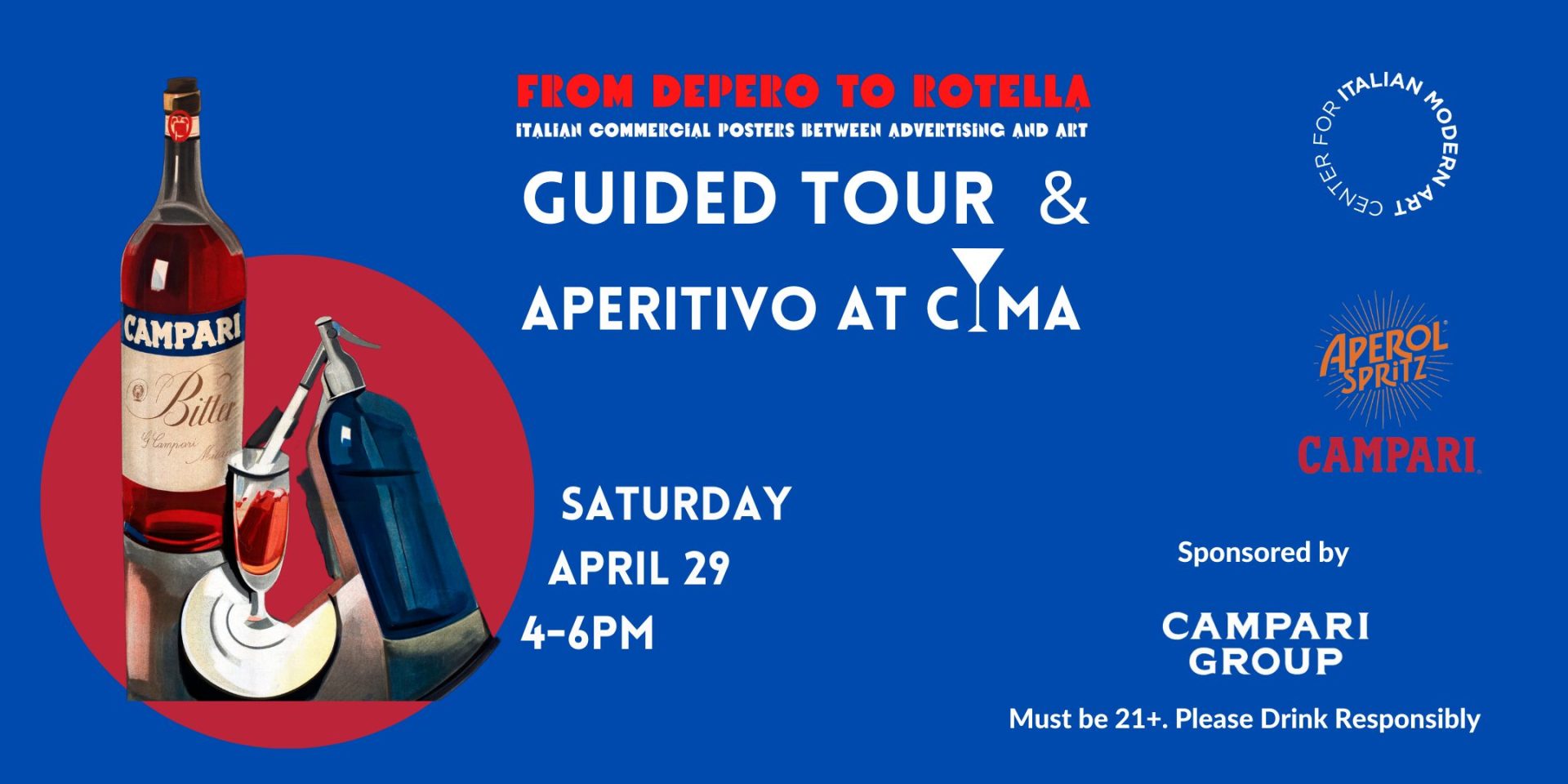
Admission: $20
Come for the art, stay for a drink: it all happens at CIMA!
Join us for the first of a series of guided tours and cocktail hours: enjoy a guided tour of our current exhibition From Depero to Rotella: Italian commercial posters between advertising and art, led by our research Fellows; then stop by our stylish kitchen for a cocktail. Aperol Spritz anyone?
It’s the perfect combination of art, fun and good spirits. Ti aspettiamo!
Cocktails courtesy of CAMPARI GROUP. Light refreshments will accompany the cocktail.
Must be 21+. Please drink responsibly.

‘From Depero to Rotella’: an exclusive guided tour with Paul Shaw
April 28, 2023, 6:00 PM

General admission: $15. Members and Students: Free
Explore CIMA’s current exhibition From Depero to Rotella: Italian commercial posters between advertising and art through the lens of typographic design. Paul Shaw, noted calligrapher and design historian with an expertise in modernist typography, will take us on a visual survey of the posters in the show, to analyze the inventiveness and quality of their typographic solutions and contextualize them within the European modernist milieu of the ’20s through the ’60s.
Paul Shaw, an award-winning graphic designer, typographer, calligrapher and design historian in New York City, teaches at Parsons School of Design and the School of Visual Arts. The designer or codesigner of eighteen typefaces, he is the coauthor of Blackletter: Type and National Identity (Princeton Architectural Press, 1998) and the author of Helvetica and the New York City Subway System (MIT Press). He writes about letter design in the blog Blue Pencil.
Multipli Forti: Italian literary fiction festival (2nd edition)
April 26, 2023, 10:30 AM - 12:30 PM
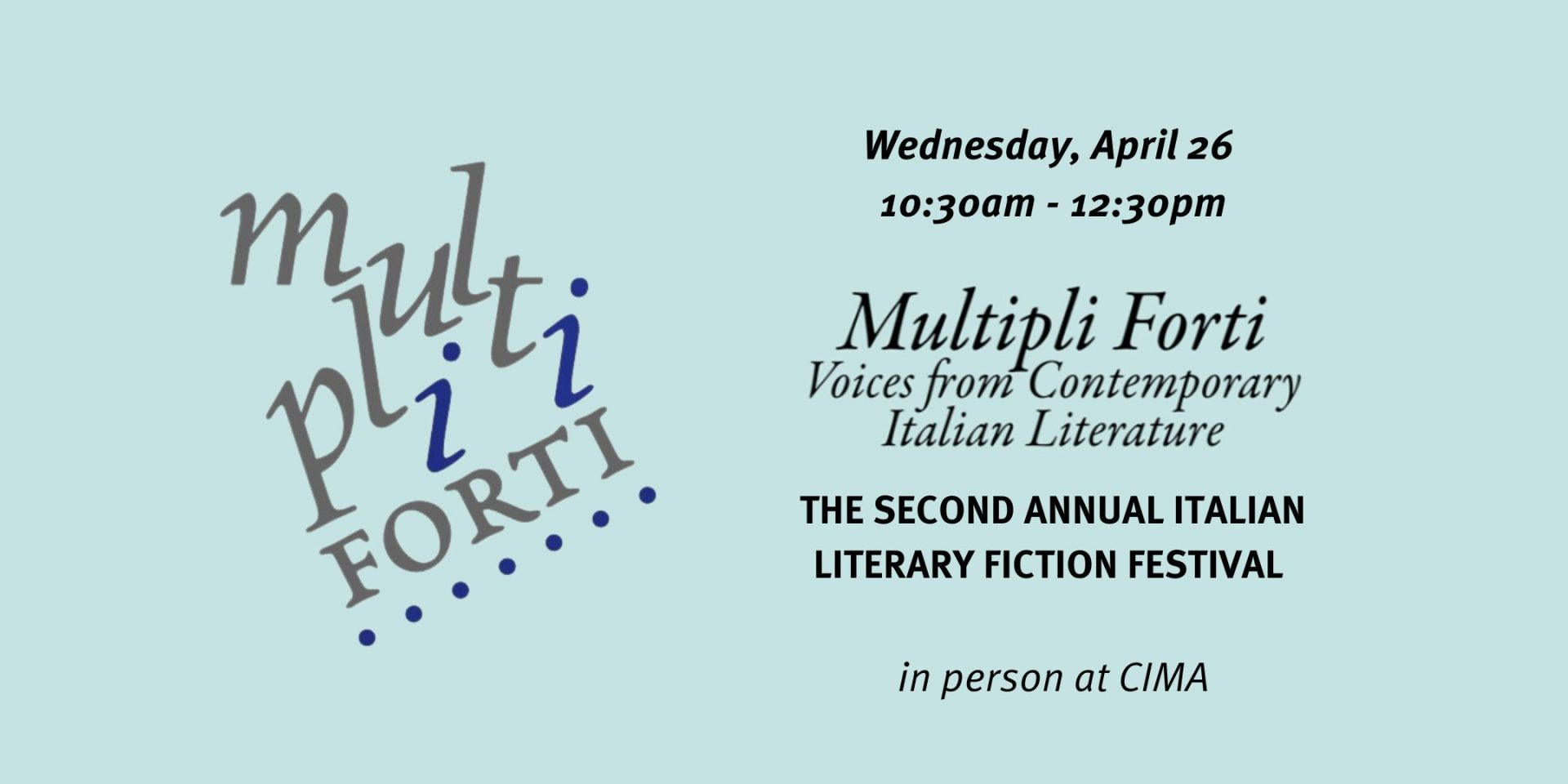
General admission: Free
RESERVE YOUR FREE TICKETS HERE!
CIMA is proud to host the morning of the second day of the second annual Italian Literary Fiction Festival.
The Italian Cultural Institute in New York
in collaboration with
Italian General Consulate in Boston — FUIS (Italian Unitary Writers’ Federation) — THE BRIDGE Award – (CIMA) The Center for Italian Modern Art) — NYU Casa Italiana Zerilli-Marimò – RIZZOLI Bookstore – – Boston Public Library – I AM Books
presents
MULTIPLI FORTI
Voices from Contemporary Italian Literature
ITALIAN LITERARY FICTION FESTIVAL – II EDITION
NEW YORK CITY
25 – 26 – 27 April, 2023
ITALIAN CULTURAL INSTITUTE – CIMA – CASA ITALIANA ZERILLI MARIMO’ NYU – RIZZOLI Bookstore
BOSTON
28 – 29 April, 2023
ITALIAN GENERAL CONSULATE – BOSTON PUBLIC LIBRARY – I AM books
An initiative aimed at the public of readers and the international publishing world (publishing houses, literary agencies, editors and translators) promoted by the Italian Cultural Institute of New York directed by Fabio Finotti with the collaboration of FUIS (Italian Unitary Writers’ Federation), with the artistic direction of Maria Ida Gaeta supported by a leading group of scholars and experts (Alessandro Giammei, Chiara Benetollo, Monica Calabritto, Luca Briasco, Eugenio Refini). The first edition was held in June 2022 and was born with the hope that it could become an annual appointment to build a literary bridge between Italy and the United States, beyond any cultural stereotype. The second edition strengthens this event and will take place both in New York City and in Boston thanks to the collaboration with the Italian General Consulate.
Multipli Forti is a transatlantic window on major literary trends of Italian fiction, told by the authors who are writing it. We asked them to think about six major themes that shape today’s literature in their language. Each event of Multipli Forti will revolve around their response to these themes, which take the form of short stories, literary memoirs and meditations, swift brief essays and, in some cases, even personal confessions. The first theme is that of individual and collective destinies, along the line that connects Dante to contemporary attempts to write in the first person—while writing about the whole world. The second theme is “Italianness” itself, and how what we call “Italian Literature” is, in fact, informed by foreign, alien, and estranging, vital influences. The hand-to-hand combat with reality is the third theme: political engagement, from the Renaissance concept of inchiesta to the current hybridizations of fiction and reportage. The fourth theme is myth, as either a fellow or an enemy to history. As reservoirs of images, history and myth blur the boundaries between fantasy and reality: they are a common language that builds communities. The fifth theme is bodies, and we associate it with the issue of power. We invited authors to think about authority, and about how authority disciplines our bodies in relation to political, literary, and psychological institutions. The last theme, Genius loci, is the theme of places, of vernacular and dialectal traditions in a land of proudly different territories, the theme of the thin line that separates the familiar from the unknown.
Click here for the complete program of events
PROGRAM at CIMA on Wednesday, APRIL 26
Breakfast
10:30 a.m.
Readings from Alba De Cespedes y Bertini’s Quaderno proibito
read by Ann Goldstein from her own translation
10:45 a.m.
Fumettibrutti and Giorgio Vasta with Ramak Fazel
RESPONDENT: Tiziana Lo Porto
MODERATOR : Chiara Benetollo
in ENGLISH
Light lunch will be served
General admission: Free
Baroquemania: a book talk by author Laura Moure Cecchini
April 12, 2023, 6:00 PM
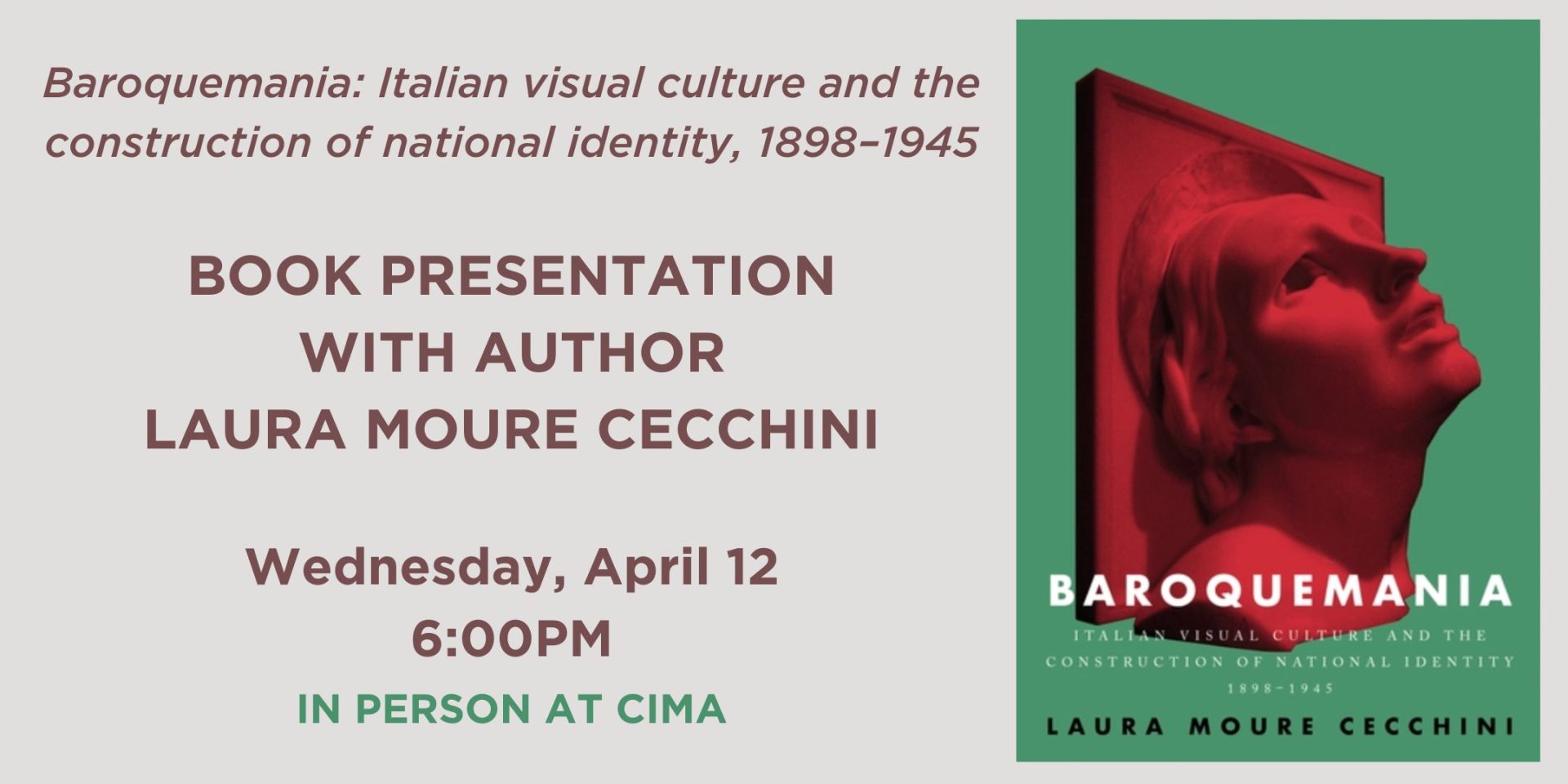
General admission: $15. Members and Students: Free
Join us at CIMA for a book talk with author Laura Moure Cecchini presenting her latest book Baroquemania: Italian visual culture and the construction of national identity, 1898–1945 (Manchester University Press, 2022).
The author will be in conversation with Prof. Karen Raizen, Bard College, and with Giorgio Di Domenico, CIMA Research Fellow.
Laura’s book studies the cultural politics of the Baroque in Italian modernism. This book radically reconceptualises Italian post-unification visual culture by exploring an element that has, until now, been systematically ignored: its fraught entanglement with the Baroque.
Evoking a glorious past – the Roman Empire, the Middle Ages, the Renaissance – played a key role in constructing a common Italian identity following the country’s unification in 1861. But the Baroque was considered too extravagant, kitsch, and whimsical to serve the aggressive nation-building impulse that led to Fascism. Baroquemania sets out to redress this narrative. It interrogates a diverse range of media, from paintings, sculptures, and buildings to commercial illustrations, postcards, posters, pageants, photographs, films, and exhibitions. Situating Italy within European and Latin American reimaginings of the Baroque, the book proves how widespread use (and misuse) of the style was integral to articulating Italians’ ambivalent relationships with modernity and tradition.
Unravelling the Baroque’s protean afterlife in the work and writings of Umberto Boccioni, Giorgio de Chirico, Armando Brasini, Adolfo Wildt, and Lucio Fontana, among others, this book reveals the Baroque’s role in pioneering a distinctively Italian approach to modern art, one that was neither anti-modernist nor fully committed to avant-garde values. By examining how the Baroque haunted Italian visual culture, Baroquemania offers a fresh look at an essential aspect of Italy’s development into a modern nation.
Light Refreshments will be served.
Laura Moure Cecchini is Assistant Professor (Ricercatore di tipo B) in the Department of Cultural Heritage at the Università di Padova (Padua, Italy). She was a recipient of the Lauro de Bosis Postdoctoral Fellowship at Harvard University and Associate Professor of Art and Art History at Colgate University. Her research focuses on the transnational legacies of fascist visual and material culture. She is now at work on two projects, one analyzing artistic exchanges between Italy and Argentina in the context of transatlantic fascist diplomacy, and the other on the material ‘debris’ of Italy’s invasion of Ethiopia. Her work has appeared in The Art Bulletin, Selva, Third Text, Modernism/modernity, and Oxford Art Journal. Laura’s research has been supported by grants from the National Endowment for the Humanities, CIMA- Center for Italian Modern Art, The Wolfsonian-Florida International University, and the Cesare Barbieri Fund at Trinity College, among other institutions.
Italian Design and the Invention of Made in Italy: a talk by Prof. Elena Dellapiana
March 23, 2023, 6:00 PM
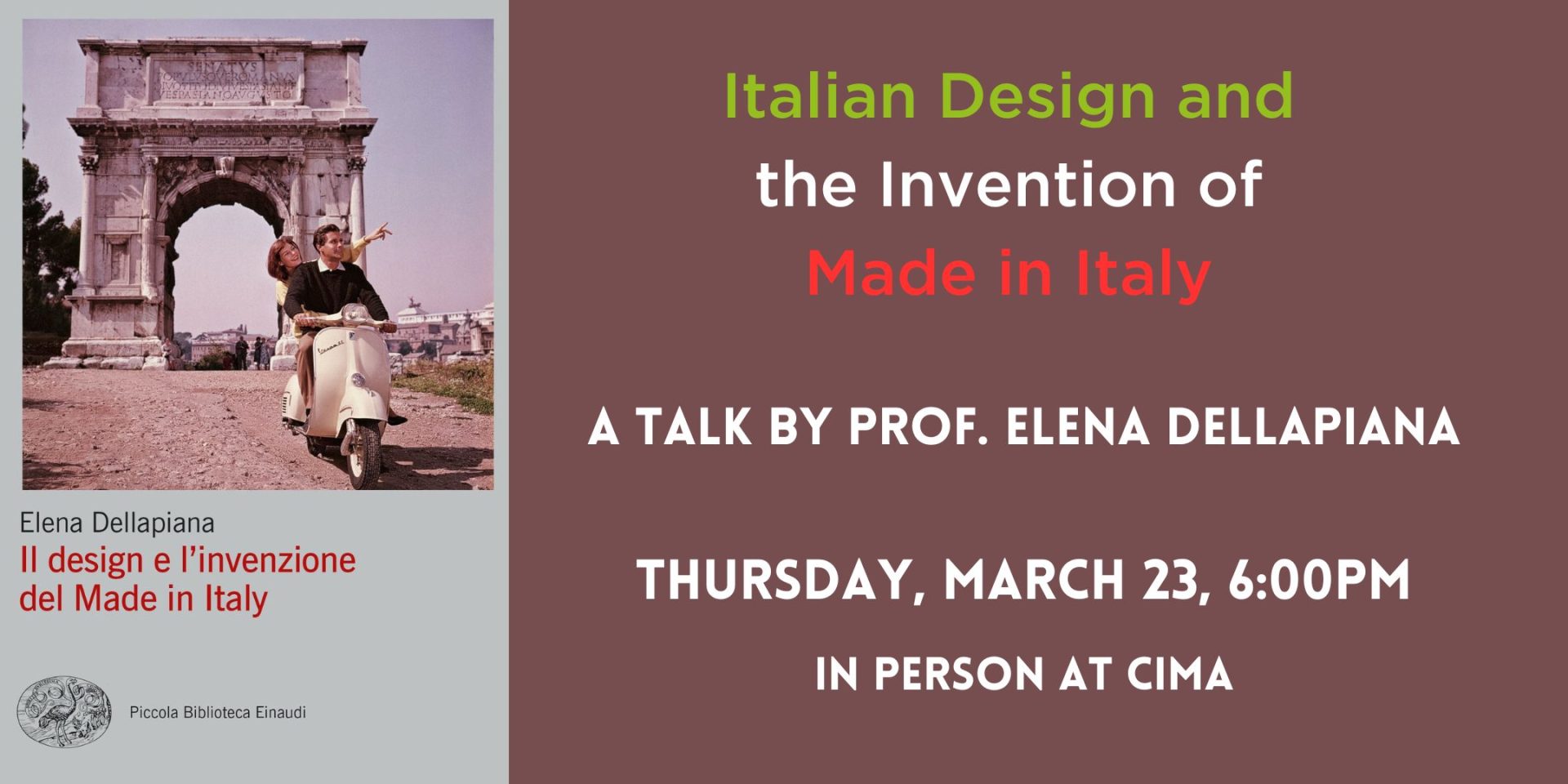
General admission: $15. Members and Students: Free
Professor Elena Dellapiana will examine the concept of Made in Italy in its various meanings and iterations: from an indication of provenance for products to a definition of an entire lifestyle, from a signifier of prestige to a label at the center of legal battles, from an indicator of innovation in industrial technologies and design to an anchor of tradition and craftsmanship.
“Made in Italy”, indeed, is above all, the realization of an intangible yet powerful aura shared all over the world and synonymous with elegance and the magical alchemy between innovation and tradition.
The discourse concerns how the formula that has communicated and amplified Italian products since the universal exhibitions of the 19th century has been arrived at focusing, also thanks to regulatory and propagandistic actions, on categories that enrich the simple meaning of “made in Italy”: Mediterraneanism, craftsmanship, artisticity, ingredients that, in turn, define the elusive category of design. And design, in its transition between artistic craftsmanship and industrial product, has prompted reactions, mostly favorable if not adoring, in the international markets and public, which have helped to shape a veritable category of the spirit in a continuous game of cross-references between cues from Italian designers and companies and replicas matured in countries with a high level of debate on design culture.
Elena Dellapiana, Architect, PhD, is Full Professor of Architecture and Design History in the Department of Architecture & Design at the Politecnico di Torino (Italy). She is a scholar of architecture, town and design history of the nineteenth and twentieth century. She is one of the authors of Storia dell’architettura italiana: L’Ottocento, ed. A. Restucci (Milan: Electa, 2005); Made in Italy. Rethinking a Century of Italian Design eds. K. Fallan and G. Lees Maffey (Bloomsbury: 2013). Among her publications: Il design della ceramica in Italia 1850-2000 (Milan: Electa, 2010), Il design degli architetti italiani 1920-2000, with F. Bulegato (Milan: Electa, 2014), Una storia dell’architettura contemporanea, with G. Montanari (Torino: Utet, 2015-2020). She recently edited Museographie. Musei in Europa negli anni tra le due guerre, with M.B. Failla and F. Varallo (Sagep: Genova 2020) and Bruno Zevi. History, Criticism and Architecture after WWI, with M. Cassani Simonetti (Franco Angeli: Milano 2021; her latest book is Il Design e l’invenzione del Made in Italy, (Einaudi: Torino 2022). She is the director (with Giampiero Bosoni and Jeffrey Schnapp) of the magazine “AIS/Design Journal”, focused on design History and organ of the Italian Design Historians Association (AIS/Design)
‘Cronaca di un Amore’: a film screening at CIMA
March 09, 2023, 6:30 PM
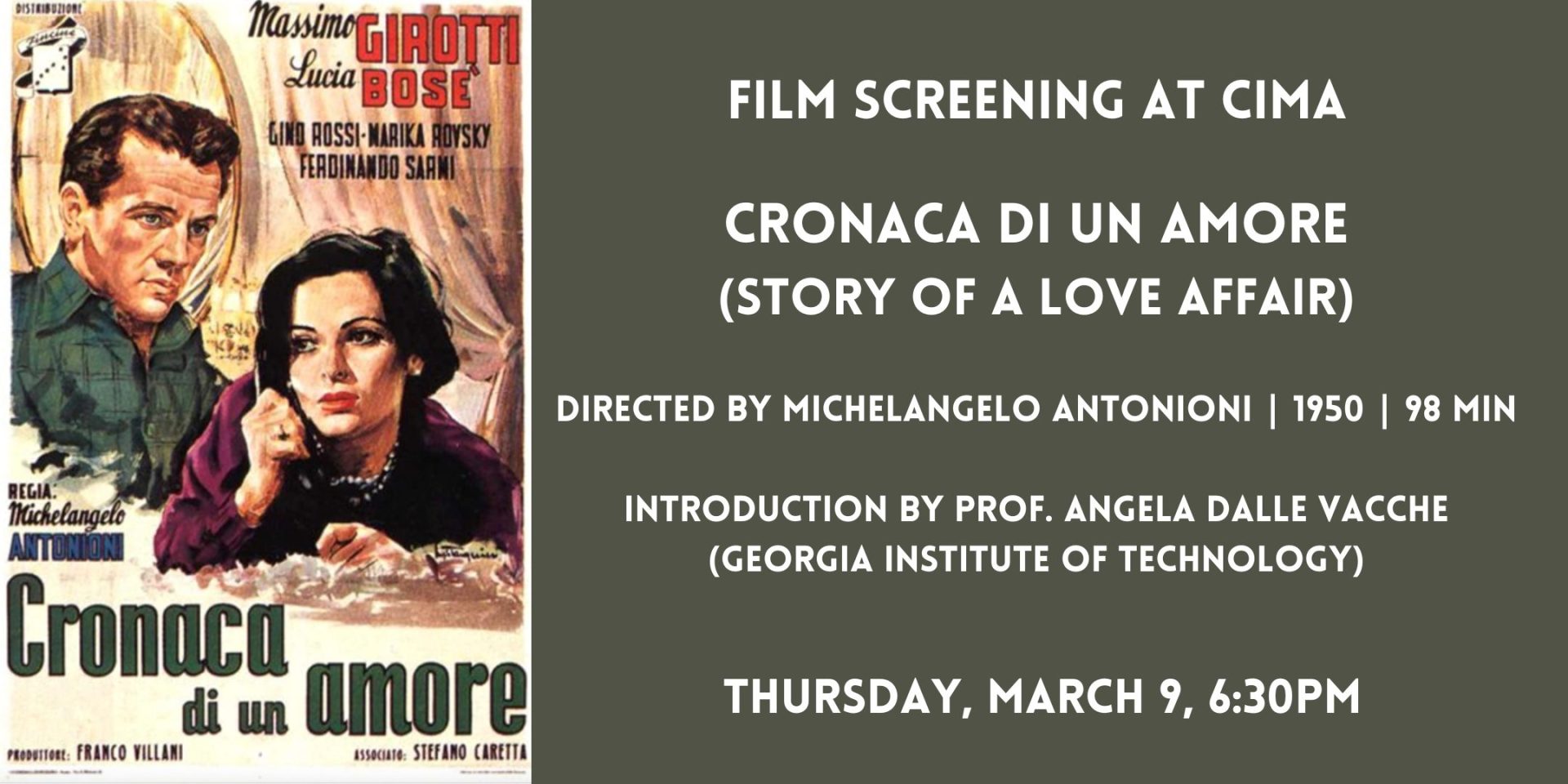
General admission: $15. Members and Students: Free
In conjunction with CIMA’s current exhibition From Depero to Rotella: Italian commercial posters between advertising and art, we are hosting an in-person screening of director Michelangelo Antonioni’s 1950 debut full-length film, Cronaca di un Amore (Story of a love affair), a drama starring Lucia Bosè and Massimo Girotti.
Angela Dalle Vacche, Professor Emerita at Georgia Tech, Ivan Allen College of Liberal Arts, will introduce the screening.
Michelangelo Antonioni’s brilliant debut movie, a sleazy, seedy neorealist noir set in postwar Milan, Story of a Love Affair’ is a riveting, taut drama. —Peter Bradshaw, The Guardian
Synopsis: A wealthy industrialist, Enrico, hires a private detective to investigate his wife Paula, ironically bringing her back into contact with her former lover, Guido. Together they resurrect a lost passion. Meanwhile, detective Carloni discovers a disturbing connection between Paola, Guido, and the death of Guido’s fiancée Giovanna.
In Italian with English subtitles (98min)
Angela Dalle Vacche, Professor Emerita at Georgia Tech, Ivan Allen College of Liberal Arts, is a specialist in the intersection of aesthetic theory and film history. She was born in Venice, Italy and came to the United States in 1978. She has graduate degrees in American Studies (1980) and Film Studies (1985) from Mount Holyoke College and the University of Iowa. She has been the recipient of a Fulbright Travel Grant; a Mellon Fellowship; a Rockefeller Bellagio Grant; a Leverhulme Distinguished Senior Professorship at the University of London, Birkbeck College; and a Dora Maar Fellowship in Menerbes, France. In 2016, she lectured on Cinema and the Museum at the Institute for Marketing and Technology in Lucca, Italy. Dalle Vacche’s retrospective Italian Silent Divas: Passion and Defiance for the 2000 New York Film Festival was voted as “Best Event of the Year,” by Art Forum. Dalle Vacche has given guest-lectures in Europe, Asia, and Australia. Among her publications: The Body in the Mirror: Shapes of History in Italian Cinema (Princeton Legacy Library, 1992); Cinema and Painting: How Art Is Used in Film (University of Texas Press, 1996); Diva: Defiance and Passion in Early Italian Cinema (University of Texas Press, 2008). André Bazin’s Film Theory: Art, Science, Religion (Oxford University Press, 2020). Among her published anthologies: The Visual Turn (Rutgers University Press, 2002); Color, The Film Reader (Routledge, 2006); Film, Art, New Media: Museum Without Walls? (Palgrave Macmillan, 2012).
‘I Grandi Magazzini’: a film screening at CIMA
February 28, 2023, 6:00 PM
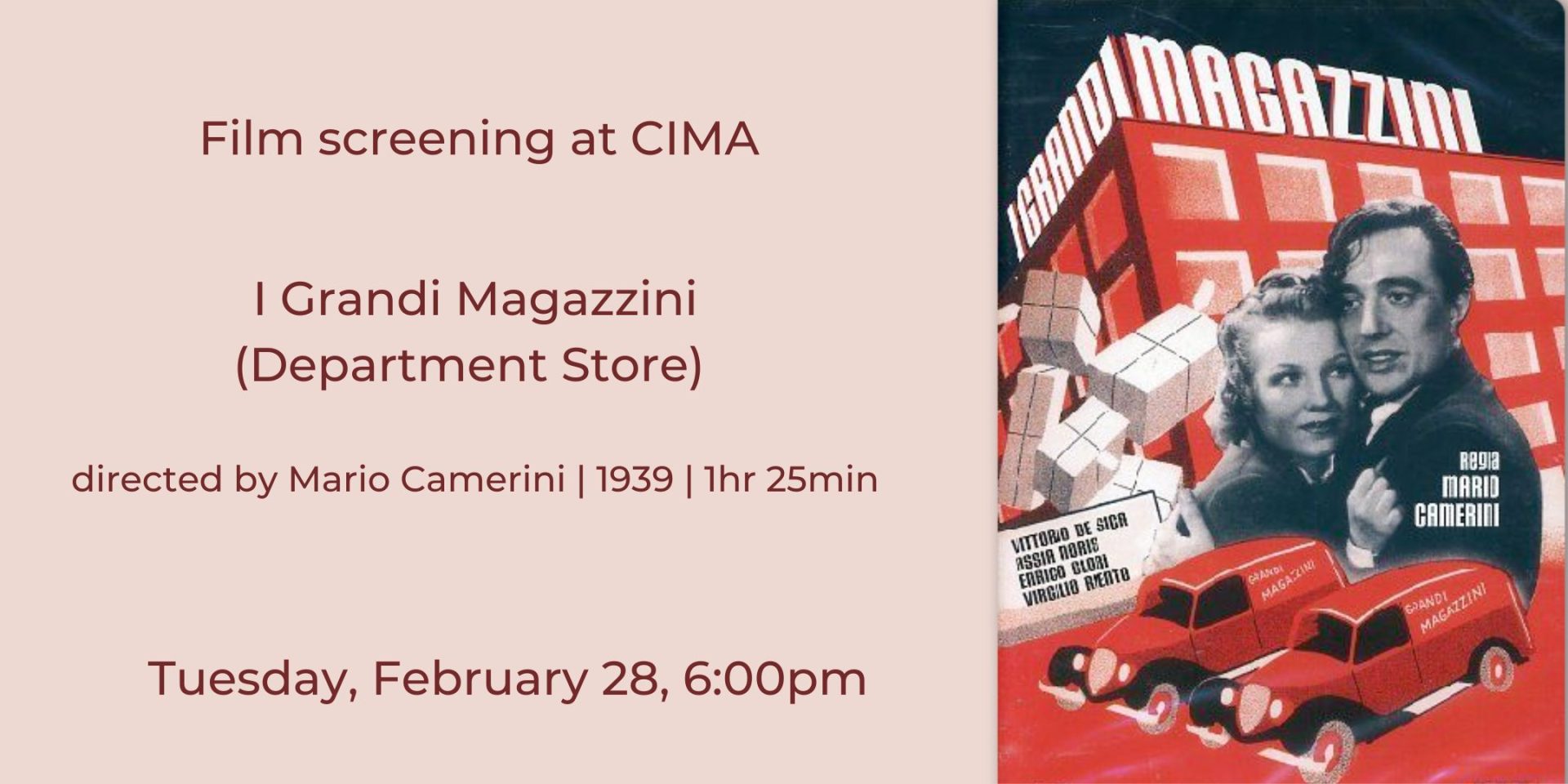
General admission: $15. Members and Students: Free
In conjunction with CIMA’s current exhibition From Depero to Rotella: Italian commercial posters between advertising and art, we are hosting an in-person screening of Italian director Mario Camerini’s 1939 film I Grandi Magazzini.
Victoria de Grazia, Moore Collegiate Professor Emerita of History at Columbia University, will introduce the screening.
A light sentimental comedy, typical of the Italian cinema of the 1930s and 1940s, the plot revolves around a lavish department store, depicting an environment in which consumption starts to pervade the Italian lifestyle.
Synopsis (via Wikipedia): Some thefts take place in the Department Stores. The personnel manager, who has his eyes on a salesgirl, accuses her and blackmails her. However, the girl, engaged to a chauffeur, is innocent. Who is behind the thefts?
In Italian with English subtitles. (1hr 25min).
Victoria de Grazia, Moore Collegiate Professor Emerita of History at Columbia University, was educated at Smith College, University of Florence, and Columbia University where she received her Ph.D. in history with distinction in 1976. Before joining the Columbia faculty in 1994, she taught at Rutgers University. Her research interests lie in contemporary history, with longstanding commitments to studying western Europe and Italy from a gendered perspective and to developing a global perspective on commercial revolutions. Her publications include: Irresistible Empire: America’s Advance Through Twentieth Century Europe (2005); The Sex of Things: Gender and Consumption in Historical Perspective (ed., 1996); How Fascism Ruled Women: Italy, 1922-1945 (1992); The Culture of Consent: Mass Organization of Leisure in Fascist Italy (1981). She is currently writing a book about intimacy and power in Fascist Italy.
‘From Depero to Rotella’ Opening Lecture by curator Nicola Lucchi
February 22, 2023, 6:00 PM
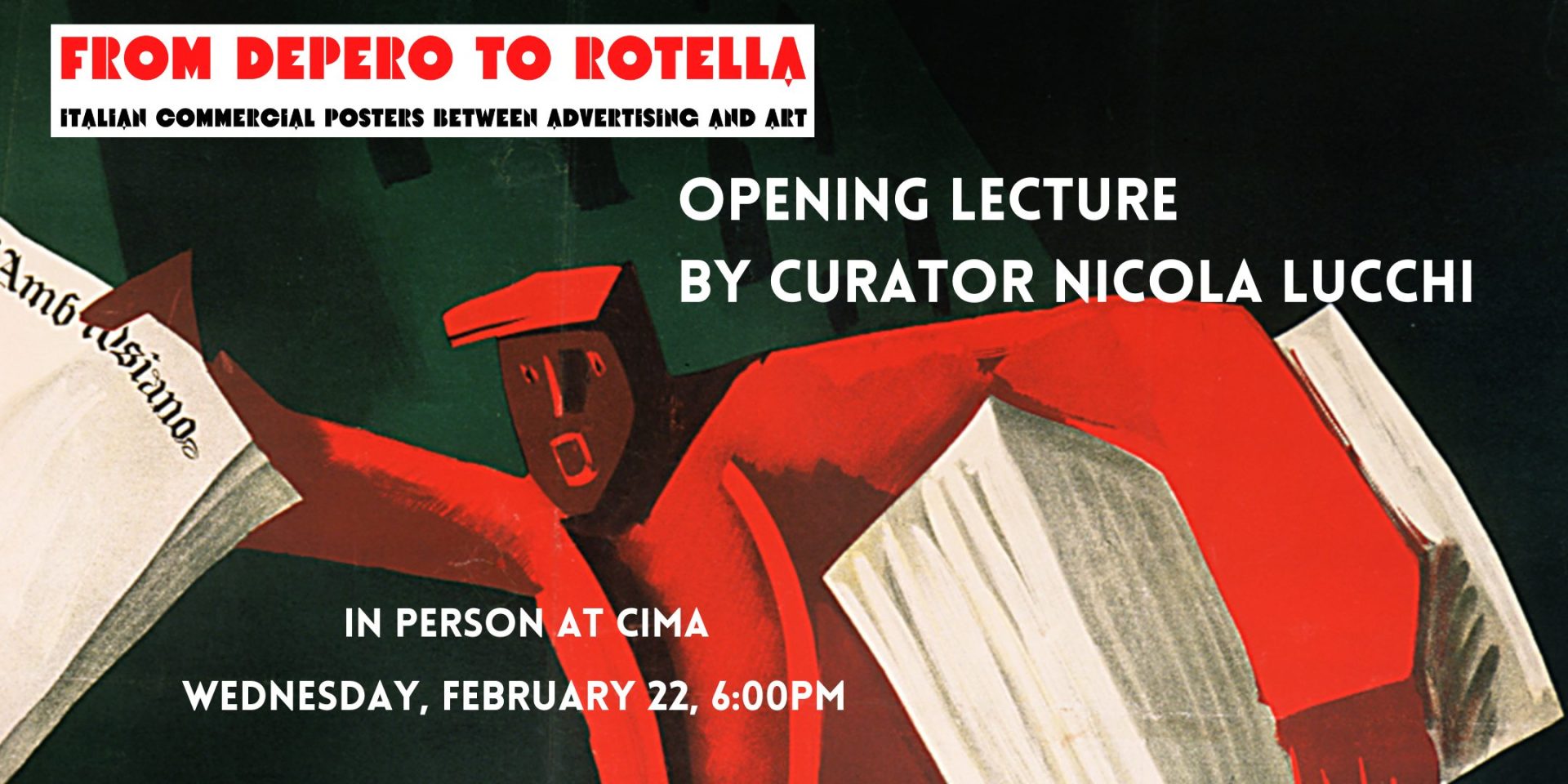
General admission: $15. Members and Students: Free
Join curator Nicola Lucchi who will illustrate the concept of the exhibition From Depero to Rotella: Italian commercial posters between advertising and art, and analyze some of the key works exhibited in the show.
Nicola will demonstrate how, while poster art has often been described as derivative in character, from Futurism onwards Italian posters acquired a visual and communicative force that elevated the medium to a form of artistic expression in its own right, pushing the boundaries of lithographic techniques, photomontage, and typography. Focusing on the period of the interwar years and the early post-World War II era in Italy, the curator will illustrate how commercial posters’ peculiar ambition to deliver alluring forms and contents to the masses, rather than to an elite circle, also make them an object of socioeconomic and philosophical interest.
The event will be held in person at CIMA. Limited in-person seating available due to COVID-19 safety protocols.
Light refreshments will be served
About the curator: Nicola Lucchi is the Executive Director of the Center for Italian Modern Art; he oversees the institution’s fellowship program, the calendar of cultural events, and serves as Managing Editor for the Center’s online scholarly journal. Prior to joining CIMA, Nicola worked as Visiting Assistant Professor of Italian at Dickinson College and Lecturer of Italian at CUNY’s Queens College. He has published scholarly articles, book chapters and catalog essays on Futurism, on the relationship between poetry and the visual arts, and on Bruno Munari, in the scholarly volume Bruno Munari. The Lightness of Art. He has also curated an exhibition on Futurist manifestos and ephemera at Queens College’s Rosenthal Library, and on propaganda art in Italy at NYU’s Casa Italiana Zerilli-Marimò. He received a PhD in Italian Studies from NYU in 2016.
Members Opening Reception: ‘From Depero to Rotella’
February 16, 2023, 6:00 PM
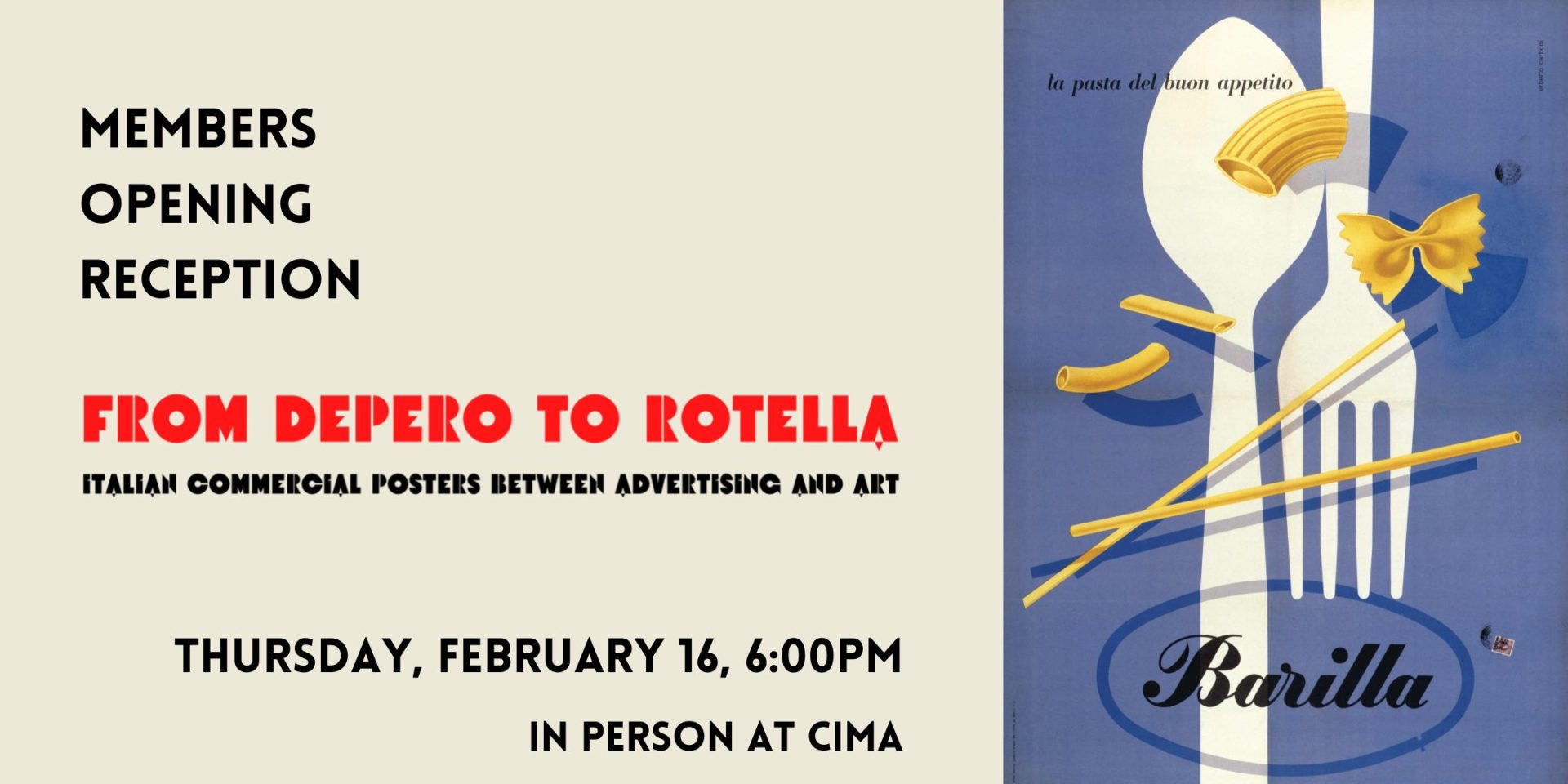
CIMA Members at any level are invited to join us for the opening reception of our new exhibition, From Depero to Rotella: Italian commercial posters between advertising and art. This will be an opportunity to view the exhibition before it opens to the public and to meet curator Nicola Lucchi.
Light refreshments will be served.
NOT A MEMBER? JOIN TODAY!
Please RSVP to lombardo@italianmodernart.org
When the Past was Present: an early representation of the deportation of the Jews of Rome
February 01, 2023, 05:30 PM - 07:30 PM
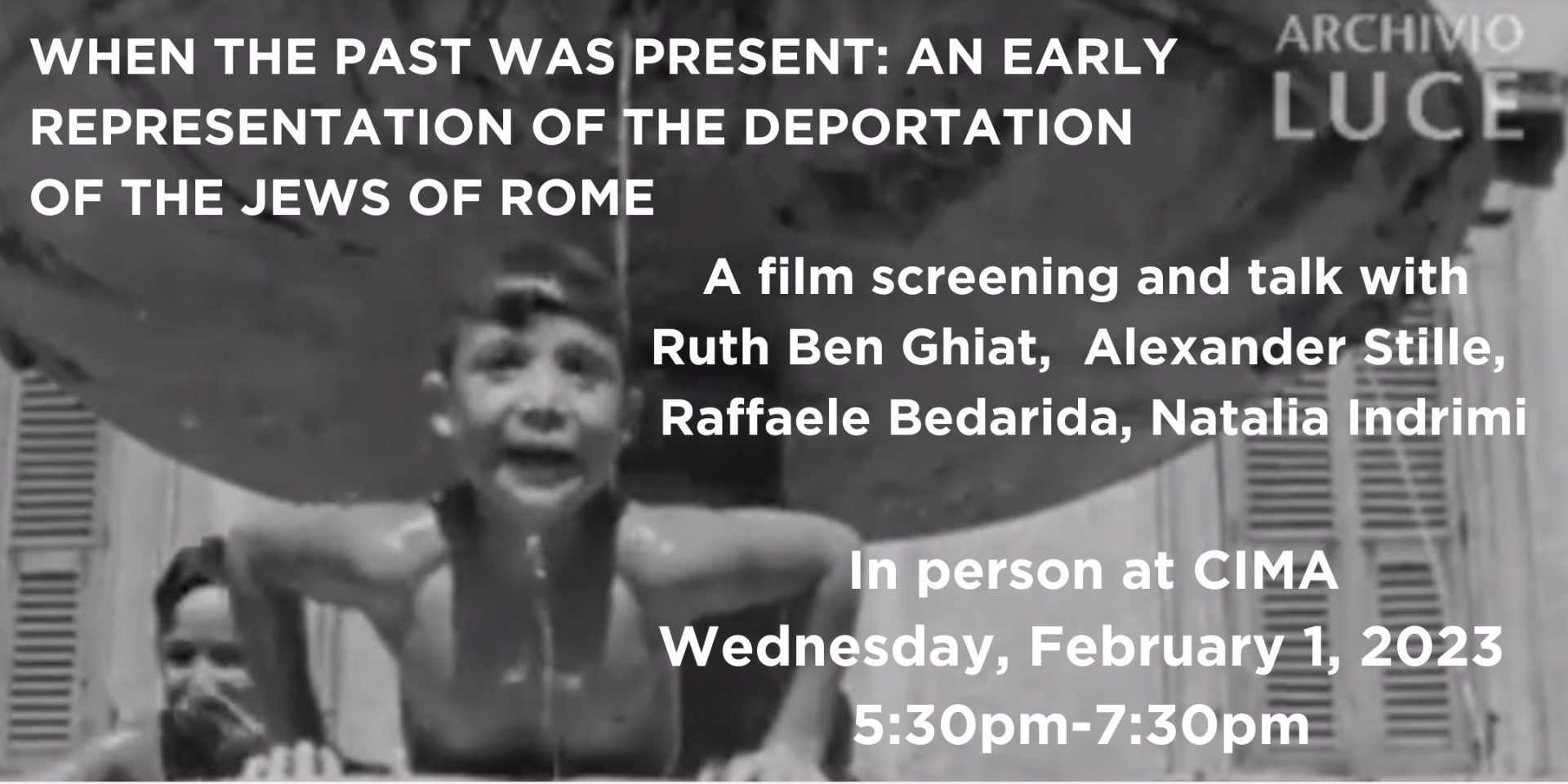
General Admission Ticket: $5; Members & Students: Free
Ruth Ben Ghiat (New York University), Alexander Stille (Columbia University), Raffaele Bedarida (Cooper Union), and Natalia Indrimi (Centro Primo Levi NY) will present a rare 1948 film and propose some hypotheses on its history and production.
In conjunction with the activities organized by the Italian Consulate for the International Holocaust Remembrance Day (Giorno della Memoria), this distinguished group of scholars will discuss a little-known 1948 short film, one of the earliest public recollections of the deportation of the Jews of Rome, the exile, and the birth of the State of Israel. A particular set of circumstances makes the film intriguingly enigmatic. It was directed by Romolo Marcellini, a star of colonial cinema who, after the war, found his way into the film industry promoted by the American Office of Strategic Services and aimed at portraying the rebirth of a nation. The script is by Luigi Barzini Jr., scion of a prominent family that loomed large in the Italian press since the Belle Epoque. Barzini Jr. graduated from Columbia University at a time when the institution’s leadership flirted with the Regime. He went on to be the correspondent of Corriere della Sera in Fascist Italy. His father, Luigi Barzini Sr., was a senator and remained on Mussolini’s side during the Italian Social Republic becoming director of Italy’s leading press agency, Agenzia Stefani. After the war, Luigi Barzini Jr., with clearance from the Allied authorities, founded the press agency Libera Stampa and continued his career as a screenwriter and one of the editors of the prestigious media group La Settimana Incom.
The context that originated this film is unknown. Undoubtedly someone guided the director and the writer through the recent memories of Roman Jews. Someone who knew well not only the story and the wounds, but the streets, the places, and the religious rituals. Someone who helped mediate between the small Italian Jewish world brutally betrayed by its own country and a new republic that reluctantly had to come to terms with the sight of its recent past.
This event is organized in collaboration with Centro Primo Levi, New York.
To view the full program of activities commemorating Il Giorno della Memoria, click here (or access the pdf version here).
